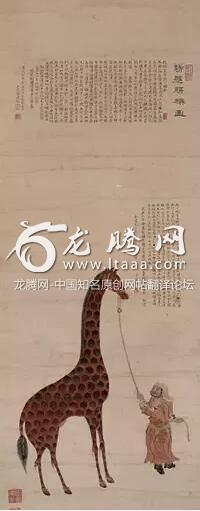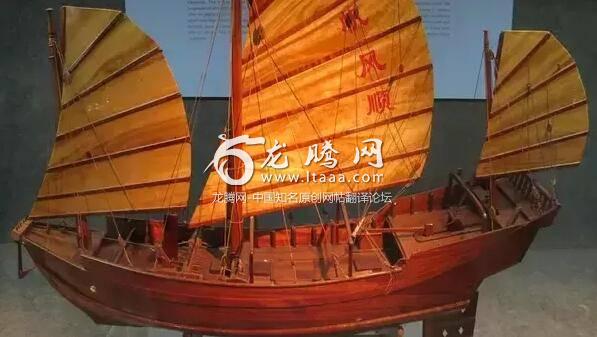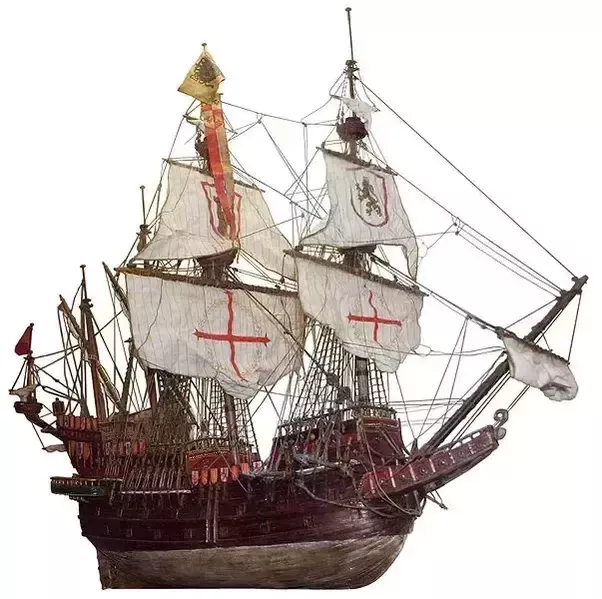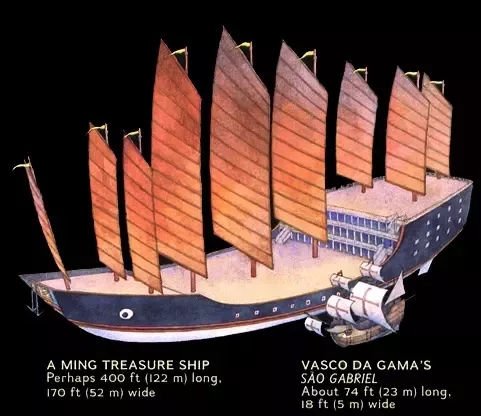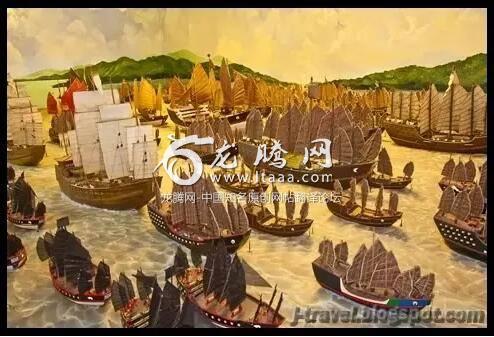为什么中国不像欧洲人那样开拓殖民全世界? [美国媒体]
quora网友:这是一个很好的问题。历史学家们仍在试图弄清楚为什么有了丰厚资源、充足人力和先进技术的中国不愿意去殖民世界。事实上,在公元600年唐朝时期,中国的造船和航海技术已经先进到能跨越太平洋“发现”和殖民西半球、澳大利亚或新西兰的程度.......
-------------译者:龙腾翻译总管-审核者:龙腾翻译总管------------
Why didn't China colonise the world like the Europeans?
为什么中国不像欧洲人那样开拓殖民全世界?
-------------译者:龙腾翻译总管-审核者:龙腾翻译总管------------
Feifei Wang I spend about the same amount of my life in China and in the US. upxed Apr 20
Because we seriously believed we had everything. Think about the stuff the Spanish and the English people wanted when they sailed off:
因为我们真的相信我们拥有一切。想想西班牙和英国人起航时他们想要的东西:
Spices? Had those
Silk? We basically invented it.
Gold? Plenty!
Silver? Shit load of.
Farm land? Miles and miles and miles…
Large amount of cheap labor? More than enough.
Natural resources? Which kind? Never mind… we have them all.
香料?早有了。
丝绸?基本上是我们发明了它。
黄金?多得很!
银(器)?多得成堆。
农田?丰阔到绵延万里…
大量廉价劳动力?多到用不尽。
自然资源?你说哪一种?没关系…我们哪种都有。
And on the flip side:
Religious oppression? Nope don’t care about religion. You believe whatever shit you want just obey our laws and don’t rebel against government.
Need land for penal colony? Nope we execute our prisoners each fall the rest get to serve in the army.
Land too poor can’t support local population? Nope. OK some lands might be poor there’re definitely bad years but moving around usually means cross the mountain not sailing across the ocean.
Do you know what China did need at the time?
Trade. So we sent out a big fleet to discover trade routes and we brought back shit China didn't have….
然后在另一方面:
宗教压迫?不存在这种压迫,因为我们根本不在乎宗教。只要你想随你爱信什么都行,只要你遵守我们的法律不反抗政府。
需要土地作为罪犯的流放地?完全不用,每年秋天我们都会把囚犯处死,剩下的也会让他们去军队服役。
土地太过贫瘠以至于不能养活当地人口?这种情况不会发生。好吧,有些土地可能很贫瘠,肯定也有农作歉收的年份,但是搬离(灾地)通常也只意味着会穿越一座高山(到达新地),而不是扬帆航行过一片海洋。
你知道当时的中国需要的是什么吗?
贸易。所以,我们派出了一个大舰队探索新的贸易路线,然后我们带回了当时中国并没有的…
Giraffes!
长颈鹿!
Zheng He be like: Your Highness! Just look at it!!! Isn’t it cute? Have you ever seen such thing before?
And the Ming emperor be like: Hell No!!! Love this shit! I’m gonna name it 长颈鹿 (long neck deer) because it looks like a deer but has long neck! Totally worth the trip! Here’s more money go bring back more cute stuff and open some ports so we can trade with them.
We don’t need colonies we don’t need labors and economic crops to support our dying economy back home.
So we didn’t colonize places.
郑和他可能会这么说:殿下!请看看此物!!!是不是很可爱啊?你以前见过这种动物吗?
然后明朝皇帝可能会这么说:完全没有!!!寡人爱死这玩意了!寡人将给它取名为长颈鹿,因为它看起来像鹿,脖子却很长!这次航行真是太值了!来爱卿你拿着更多的钱,给寡人带回更多可爱的东西,然后开放一些港口,这样我们就可以和他们贸易了。
我们不需要殖民地,是因为我们不需要廉价的劳动力和足够的经济作物来支撑我国垂死的经济。
所以,我们没有殖民化其他地区。
-------------译者:营养快线-审核者:hht288------------
Pablo Djankowicz Ruizinowitz History major interested in tid-bits about WWII upxed Mar 27
This is a great question. Historians are still trying to figure out why China was unwilling to colonize the world since it had the resources the manpower and the technology to make it happen.
这是一个很好的问题。历史学家们仍在试图弄清楚为什么有了丰厚资源、充足人力和先进技术的中国不愿意去殖民世界。
In fact China had the shipbuilding and navigational know-how to make it across the Pacific to “discover” and colonize the Western Hemisphere and Australia/New Zealand if it felt like doing that by the time of the Tang Dynasty in the 600s AD.
事实上,在公元600年唐朝时期,中国的造船和航海技术已经先进到能跨越太平洋“发现”和殖民西半球、澳大利亚或新西兰的程度。
During the trade-friendly sea-faring Northern and Southern Song Dynasties China had a huge trading fleet that numbered tens of thousands of boats that could ply the South and East China Seas with ease. Overseas trade was so important in fact that for the only time in Chinese history the Southern Song Dynasty of the 1100s AD and 1200s AD had its capital on the ocean in the modern-day port city of Hangzhou. (All Chinese capitals before and since have been deep inland far away from the coast like Beijing. Most Chinese dynasties except for the Southern Song deeply distrusted trade and the powerful rich merchants that trade tends to foster.)
在航海贸易友好往来的南北宋时期,中国已经拥有一支由数以万计的船只组成的庞大舰队能轻松往返于中国东海和南海沿岸。海外贸易是如此重要,以至于在中国历史上,存在于公元12世纪到13世纪的南宋是唯一一个把首都建在沿海地区,现代港口城市杭州的朝代。(自古以来中国历来都将首都建在内陆腹地,远离海岸,就像北京。除了南宋中国的大多数朝代都极度不信任贸易,认为贸易会让商人更加强大和富裕。)
The below is a model replica of a Southern Song Dynasty ship of the 1100s AD. It was quite impressive being bigger and more technologically sophisticated than any ship being built in the world at the time. These ships had huge rudders and divided sails that efficiently tacked to the wind and compare favorably to the Spanish galleons that the Europeans used for their exploration and colonization in the 1500s and 1600s (an example which is below the Southern Song Dynasty ship picture).
以下是公元12世纪南宋船只的副本模型。这艘船令人印象非常深刻,比那时世界造的任何船都更大、技术更复杂。相比欧洲人在16、17世纪探险和殖民用的西班牙大型帆船,这些船只的舵和帆都很巨大更能有效地利用风力(下图是南宋时期船只的一个范本)。
China’s seafaring technology reached its apogee during the Ming Dynasty in the early 1400s when the Yongle Emperor recruited one of his trusted eunuchs Zheng He to sail the “Treasure Fleets” to demonstrate to the world the power and riches of China. The Yongle Emperor was as far as I can tell the only Chinese emperor since the Tang Dynasty who seriously considered maritime exploration as a primary tool to expand Chinese influence and who put huge amounts of resources into making it happen.
中国的航海技术在十五世纪初的明代达到了顶峰,当明成祖招募一个他信任的太监郑和,驾驶“宝船”向世界展示中国的力量和财富。据我所知,明成祖是自唐朝以来唯一一位认真考虑以航海探险为主要工具来扩大中国影响力的中国皇帝,他为此投入了大量资源来实现这一想法。
These “Treasure Fleets” set out from Nanjing the Ming Dynasty capital at the time and went throughout the Indian Ocean some making it all the way to the East African coast. There were 7 expeditions that took place between 1405 and 1433.
这些“宝藏舰队”从当时的明朝首都南京出发,穿过印度洋,有些船舰甚至一直延伸到东非海岸。1405至1433年间一共进行了7次远征。
-------------译者:营养快线-审核者:hht288------------
The below is an example of how sophisticated China’s shipbuilding technology had become. The very big boat was one of the flagships of Zheng He’s “Treasure Fleets” which sailed from China to Indonesia to India. The much smaller boat was the European flagship that Vasco Da Gama the Portuguese explorer used to sail around the Cape of Good Hope at the southern tip of Africa on his way to “discover” India in 1498. That flagship was at the cutting edge of European sailing technology. Just look at how massive the differences were in technological know-how.
如下图例表明中国的造船技术是多么复杂精致。这艘非常大的船只是郑和的“宝船舰队”中的一艘旗舰,它从中国航行到印度尼西亚再到印度。这艘小得多的船只是葡萄牙探险家达·伽马驾驶的欧洲旗舰,在1498年航行到非洲南部顶端好望角附近的过程中“发现”了印度。该旗舰是欧洲帆船技术前沿的产物。好好看看这两者技术工艺之间的差异有多巨大。
Below you can see a whole “Treasure Fleet” decked out sailing the seas. Each fleet contained hundreds of boats each boat with hundreds of men. In total around 20000 people would be on board one of these fleets which made a fleet as populous as a contemporary city and the largest armada of its kind in the world at that time. And these fleets sailed for thousands of miles per trip. It was quite impressive. By contrast Vasco da Gama’s fleet in 1498 contained four tiny ships and at most 170 men.
China as a result would’ve crushed Europe if it had been competing as a colonizer in the early 1400s.
下图你可以看到完整的“宝藏舰队”在海上航行的辉煌画面。每支舰队包括数百艘船只,而每艘船只载有数百名船员。总的来说,一支舰队大约有2万名船员,人数跟现代一些城市相当,是当时世界上同类舰队中最大的。这些船队每趟航行数千英里。这真是相当惊人。相比之下,1498年的达·伽马的舰队只包含四艘小船,船员最多为170人。因此在15世纪早期,中国若成为殖民者参与进殖民竞争它将摧毁欧洲。
Alas that was not to happen. China after the Yongle Emperor’s death in 1424 and the last “Treasure Fleet” in 1433 turned in on itself and began to close itself off from the outside world. Subsequent Ming emperors dismantled the great ships of the “Treasure Fleets” and used the huge amounts of money devoted to maritime exploration into building the extremely expensive Great Wall and into building and maintaining huge armies to ward off the newly powerful Mongols on the northern borders.
唉,那是不会发生的。在1424年明成祖驾崩后,最后“宝船舰队”于1433年被闲置下来,中国开始关闭与外界的联系。后来的明朝皇帝拆除了“宝船舰队”的大船,并将用于海上探险的巨额钱财都用来建造极其昂贵的长城,以及建造和维护庞大的军队以抵御北部边境上新近强大的蒙古人。
It was a bad time for China to cut itself off as it was during the 1600s and 1700s that Europe began to grow technologically by leaps and bounds. And it was colonization and the continual competition it fostered among small European kingdoms (small in comparison to China that is) that caused these technological leaps and bounds.
此时闭关自守对中国来说是一个糟糕的时期,因为在17世纪和18世纪期间,欧洲的技术开始突飞猛进。殖民和持续的竞争促进了欧洲各小王国之间(与中国相比小)技术的跨越式发展。
It was the centralized nature of the historical Chinese state that led China to not explore colonize and expand outside its immediate sphere of influence in East Asia.
这是历史上中国政权中央集权的属性,使得中国没有探索、殖民和扩大其在东亚之外的势力范围。
-------------译者:龙腾翻译总管-审核者:龙腾翻译总管------------
In the 1400 years after China attained in the Tang Dynasty the technological logistical and resource capabilities of carrying out long-distance colonization there was only one period of sustained political division of warring small kingdoms similar to what characterized Europe after the fall of the Roman Empire—the Five Dynasties and Ten Kingdoms period (五代十国) which ended in 979 AD when the Northern Song Dynasty was founded. This period of disunity only lasted around 90 years or so. Otherwise all emperors who founded dynasties after the Northern Song Dynasty just took control of the previous dynasty’s powers with a rebellion or rebellions. As a result there were no “warring states” that preceded the Yuan Dynasty the Ming Dynasty or the Qing Dynasty.
15世纪,自中国在唐朝达到了进行远距离殖民的运输技术、后勤保障和资源能力后,它仅短暂有过一段类似于欧洲各小王国在罗马帝国灭亡后政治分隔战乱不断的时期——即自北宋建立后于公元979年结束的五代十国时期。这个不团结的时期只持续了大约90年。另外在北宋之后所有王朝的帝王建立者都是通过反叛或叛乱来获取之前王朝的权力。因此,在元朝、明朝或清朝建立之前,中国并没有“战国”时期。
Because of a highly centralized state any decision that happened in the imperial court either advanced or stopped projects that could lead to colonization. It’s not a great leap of logic to think that if the Yongle Emperor’s “Treasure Fleets” had continued for another 100 years after 1433 that one or two high court officials or emperors would’ve thought it would’ve been a good idea to take some land—and thus colonies—in exchange for all the money and trouble they were spending on these huge maritime expeditions.
由于国家的高度集权,任何发生在朝廷的决定都会推进或阻止可能导致殖民的项目。不需要在逻辑思维上达到质的飞跃都能想到,如果明成祖的“宝船舰队”在1433年后继续存在个100年,那么一两个朝廷高官或皇帝会觉得用一些土地——也就是殖民地——来换取航海探险中庞大的花销会是一个好主意。
Unfortunately the Ming court turned very conservative after 1433 concentrating its energies on land-based enemies mostly the Mongols. The Qing court after 1644 continued with that same land-based foreign policy very much ignoring what was happening in maritime technology. And both the Ming and the Qing courts remained deeply distrustful of overseas trade regulating and controlling it with a weird anti-outsider paranoia that kept foreigners and Chinese traders heavily monitored and restrained. It was an almost 180 degree policy turn from the openness trade-friendliness and cosmopolitanism of the Southern Song.
不幸的是,明朝在1433年后变得非常保守,集中精力对付其陆地上的敌人,大部分是蒙古人(的入侵)。清朝在1644年后继续实行同样的以陆地为基础的外交政策,非常忽视航海技术的发展。无论是明朝还是清朝都对海外贸易抱有很深的怀疑,并用一种荒诞怪异的排外主义对海外贸易进行调节和控制,严格监控和约束外国人和中国商人。相比贸易友好抱有世界大同思想的南宋来说这几乎是180度的政策大反转。
-------------译者:aspenblack-审核者:hht288------------
The Europeans because they were so politically divided did not face the same problem of over-centralization of exploration and colonization decisions as happened in China.
而欧洲人则是因为他们政治上太分裂了,所以并没有出现那种在中国那种对探险和殖民的讨论过度集中化的问题。
Christopher Columbus is a great example of this.
克里斯托弗·哥伦布就是一个很好的例子。
Columbus had this rather crazy idea that if he sailed due west from Europe that he would eventually hit Asia on the other side. Astronomers and other learned men in various European courts countered that this was impossible since considering the circumference of the Earth known at that time he would have to traverse an ocean 15000 miles wide to get to Asia. Columbus thought not that the ocean was just a mere 3000 miles wide and that he would have enough supplies to make it across to Asia. Neither astronomers nor Columbus of course knew that a huge continent lay in the way.
哥伦布当时有一个相当疯狂的想法,即如果他从欧洲西边出发,他最终会从另一边到达亚洲。天文学家和欧洲多位王室学者都反驳说这不可能。因为考虑到当时认知的地球周长,他必须穿越1万5千英里宽的海洋才能到达亚洲。但哥伦布不这样认为。海洋只有3千英里宽,那他的补给足够让他撑到抵达亚洲。当然,无论是天文学家还是哥伦布,都不知道这途中还有一个巨大的大陆。
Columbus with his new ideas first went to the King of Portugal to see if he could get the money for his expedition. The King conferred with his experts and advisors and turned Columbus down on precisely the grounds I gave above. After a few years Columbus went to the King of Portugal again and again the King turned him down—this time because Portuguese explorers had just rounded Africa and the King needed to conserve his money for expeditions to India. He then went to the courts in Genoa and Venice in Italy—at that time very rich cities capable of giving him the ships and money to sail across the Atlantic. They also turned him down. He sent his brother to the King of England to see if he could sell that court on his expedition idea. The English King turned him down. Columbus was finally down to the Spanish court of Queen Isabella and King Ferdinand. Isabella remained skeptical but Ferdinand became intrigued. Columbus finally convinced him he convinced his wife and off Columbus went in 1492 with the necessary ships and money to cross the Atlantic.
哥伦布带着他的新想法,先拜访了葡萄牙国王看他能否为他的远征筹得资助。国王跟他的专家顾问团商议后,正是以我上述理由拒绝了哥伦布的提议。几年后,哥伦布再次拜访葡萄牙的国王,国王再次拒绝他——而这次是因为葡萄牙的探险家刚绕过了非洲,国王要省钱来远征印度。之后他拜访了在意大利的热那亚和威尼斯王室——这是当时两座非常富有的城市,足以供他横渡大西洋的船只和资金。然而他们也拒绝了他。哥伦布把他的兄弟送去英格兰国王那里,看他是否能向王室兜售他的远征想法。英格兰国王拒绝了他。哥伦布是最后才去伊莎贝拉女王和费迪南德国王的西班牙王室那儿的。伊莎贝拉女王对此仍然怀疑,但费迪南德国王却感兴趣。哥伦布最终说服了他和他的妻子。哥伦布于1492年离开,带着必要的船只和资金去横渡大西洋。
So Columbus had to be rejected by 5 rich and powerful monarchs before finding one who had enough faith in him to give him the money and ships he needed.
所以,哥伦布在找到对他有足够信心并供给他需要的资金和船只的人之前,他被5个有钱有势的君主拒绝过。
-------------译者:营养快线-审核者:hht288------------
And even if he had failed with the Spanish monarchs Columbus could still appeal to and convince the King of France the King of Scotland the various kingdoms and rich city-states in Italy that were not Genoa and Venice the Pope the King of Denmark the Holy Roman Emperor and the various kingdoms and city-states of Germany. Columbus in other words had a lot of choice in finding his “venture capitalist investor” so to speak. His goal was to clinch one sale with one single monarch to be successful.
即使与西班牙君主的交易失败了,哥伦布仍然请求和游说法国国王、苏格兰王、除热那亚和威尼斯之外的意大利各个王国和富裕的城邦、教皇、丹麦国王、神圣罗马帝国皇帝和德国的各个王国和城邦。换言之,哥伦布在寻找“风险资本家投资者”方面有很多选择。他的目标是与一位君主达成一次成功的交易。
Imagine doing that in China—a Columbus-like explorer with a crazy exploration idea would only have one court to go to the Ming court. And if the emperor turned him down that was it. End of story. There was no other recourse there was no choice at all.
So it was this hyper-centralization of the historical Chinese state that strangled what little appetite there was for exploration and subsequent colonization among the Chinese.
想象一下在中国有一位像哥伦布这样一个有疯狂探索想法的探险家却只能去一个朝廷(求助),即明朝朝廷。如果皇帝拒绝了他,那事态只能如此,故事就这么结束了。没有其他求助资源,根本别无选择。因此,正是中国历史上国家体制的高度集中,扼杀了中国人想要探索和随后殖民的欲望。
Robert Leo Mar 19 · 49 upvotes
Wow great answer.
哇,好答案。
I would add that the Chinese simply found colonization unappealing. They have been colonizing the south/west regions for thousand(s) of years yet those regions never seemed appealing and they were reluctant to move there except during civil wars.
我想补充一点,中国仅仅是发现殖民没什么吸引它的地方。他们已经在南部和西部地区殖民了几千年,然而这些地区对他们来说似乎从未有过吸引力,除了内战期间他们根本不愿意搬到那里。
They found it much more profitable (and they don't even bother to be the trade merchants but rather the exporters) to trade with the world the British’s “China refused to trade” was and still is total Bullshit. Chinese have been trading with the Middle East/India for eons the Persians and Arab traders even settled to become the Muslim Chinese minority. Hui people - Wikipedia
他们发现与世界贸易更有利可图(他们甚至不愿意做贸易商人而是做出口商),英国的“中国拒绝交易”的说法仍然是在胡说八道。中国人与中东、印度的贸易已经持续了几个世纪,波斯人和阿拉伯商人甚至因此决定定居成为中国的穆斯林少数民族。(回族-维基百科)
Actually I would say historically many empires found it more appealing to trade rather than to plunder. Plundering usually happens at the beginning of empires as culture is restored and developed technology and industries flourished war is less appealing for extracting wealth when you have the merchandise and money that the world wants.
实际上,我想说,历史上许多帝国发现,贸易比掠夺更具吸引力。掠夺通常发生在帝国的开始,随着文化的恢复和发展,科技和产业的繁荣,当你拥有世界所需的商品和金钱时,战争获取的财富就不那么吸引人了。
版权声明
我们致力于传递世界各地老百姓最真实、最直接、最详尽的对中国的看法
【版权与免责声明】如发现内容存在版权问题,烦请提供相关信息发邮件,
我们将及时沟通与处理。本站内容除非来源注明五毛网,否则均为网友转载,涉及言论、版权与本站无关。
本文仅代表作者观点,不代表本站立场。
本文来自网络,如有侵权及时联系本网站。
图文文章RECOMMEND
热门文章HOT NEWS
-
1
Why do most people who have a positive view of China have been to ...
- 2
- 3
- 4
- 5
- 6
- 7
- 8
- 9
- 10
推荐文章HOT NEWS
-
1
Why do most people who have a positive view of China have been to ...
- 2
- 3
- 4
- 5
- 6
- 7
- 8
- 9
- 10
